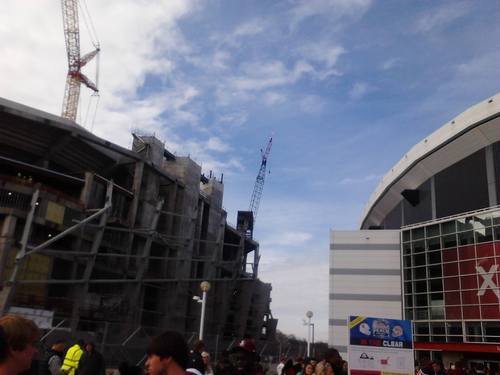Levi's Stadium in Santa Clara, California, which is hosting the 50th Super Bowl (Super Bowl L), is regarded as one of the worst stadiums in the NFL, if not the worst. So why is it hosting the best game? It's all about rewarding teams with new stadiums, even if they aren't ready to host a Super Bowl.
Earlier in the year, Baltimore Ravens Justin Tucker, one of the best in the league, sought to make a field goal. But he was, by all accounts, partly swallowed up by a sort of sinkhole in the middle of the field, missing his 3-pointer, of course. It was hardly the only play of the game where players slipped and slid on the field, affecting the outcome of the game.
Levi's Stadium is regarded as the worst NFL field, as the 49ers football team that plays on it can't even get real practices in. They've had to continually resod the field. Practices have to be canceled while the stadium is fixed. But it's a new stadium, and that's all that matters.
The National Football League can't wait to show off its new toys. As soon as a team starts talking about building a new stadium, they get to host the next Super Bowl, whether they are ready for it or not.

Atlanta's new stadium is already being considered for a Super Bowl, even though it's still being built.
Longtime stadiums that have proven their effectiveness are by-passed in favor of the latest model. You'll never see a Super Bowl at a place like Lambeau Field in Green Bay or Soldier Field in Chicago, even though they have none of the problems other stadiums have.
Levi's Stadium was rushed in its construction, according to the site Sportsgrid. This accounts for the numerous problems. But it's hardly the only case of a poorly designed field thrown together that was rewarded with a Super Bowl, or even multiple Super Bowls.
While Miami Dolphins owner Joe Robbie was building a new football stadium to replace the Orange Bowl in 1987, the NFL rushed to award the team the 1989 Super Bowl. During the game, the crappy field led to a gruesome injury to All-Pro Defensive Lineman Tim Krumrie, regarded as one of the worst sports injuries in history, on a routine play. He was never the same again. And neither was the stadium.
The stadium was poorly designed, as fans are nearly twice as far away from the game as in other stadiums by one estimate, because it was built to accommodate soccer and baseball. It bakes the fans on both sides in early season games. It does not protect the fans from the elements. Many fans headed for the exits during one Miami Super Bowl, thanks to a tropical drenching.
Top notch cold weather football towns like Pittsburgh, Kansas City, Denver and Washington, DC are denied the right to host a game, but nobody minds when torrential downpours mar games played in Florida (Miami and Jacksonville, also given a Super Bowl for upgrading their stadium).
Houston is supposed to get the next Super Bowl (Super Bowl LI), even though their own mediocre field may be responsible for several injuries of key Houston Texans football players. But they have a brand-new field, so Houston "has" to get the game, according to the NFL.
Now the Atlanta Falcons are building a new stadium. Even though they haven't finished construction, they are already lobbying to be a Super Bowl host, with tax dollar incentives hanging in the balance.
If the Super Bowl wants a better product, with a better fan experience and fewer injuries or poor play on a sub-par stadium field, it should reward the cities with fields that have stood the test of time, and provide the best for fans. Stadiums shouldn't get the Super Bowl until they have demonstrated competence in field and fan quality first.
John A. Tures is a professor of political science at LaGrange College in LaGrange, Ga. He can be reached at jtures@lagrange.edu.
